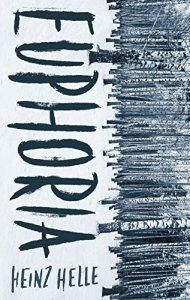 Euphoria, by Heinz Helle
Euphoria, by Heinz Helle
I was absolutely blown away by Superabundance last year, and resolved to read anything Heinz Helle wrote then and there. His stories are philosophical ruminations told through tight, clean prose. This followup was slightly different territory than Superabundance, but still recognizable for its quality and conceptual vision. Euphoria was bleak and highly disturbing. I love the way the characters’ lives before and after “the event” were juxtaposed. They were never particularly good people, it just wasn’t as obvious before everything went to hell. If you would like to lose your faith in humanity, this one is the ticket. Fantastic prose, extremely depressing, but it gives you a lot to think about.
It’s difficult to determine which parts of Ice are actually happening and which are hallucinated by our unnamed protagonist. Making it even more disorienting, the point-of-view dips away from first person occasionally, capturing events that happen (maybe?) when he isn’t present, only to snap right back to our protagonist’s perspective as if nothing happened. Although, maybe he was actually there the whole time, he’s not really sure himself. Sometimes, mid-book, his character takes on attributes and personas that are entirely new, (he is an invading military figure for a few paragraphs), only to suddenly not be anymore. There’s an almost omniscience to him that becomes rather disturbing. It feels highly metaphorical, but not quite so easily reducible to just that.
Ice becomes harder to label the more that you think about it. Not quite fantasy, not quite science fiction, not necessarily straightforward mimetic literature; it may be something new where those three converge. It perpetually defies classification.
I think Jonathan Lethem says it best in his forward to the 50th anniversary Penguin Classics edition:
“The whole presentation is dreamlike, yet even that surface is riven by dream sequences, and by anomalous ruptures in point-of-view and narrative momentum.”
Amen to that. It’s definitely strange, but oddly, instead of coming across as abrasive and unrefined storytelling, these tactics work to draw the reader into a multifaceted, disturbing, kaleidoscopic, fever-dream that unfolds.
 Animals Eat Each Other, by Elle Nash
Animals Eat Each Other, by Elle Nash
A story about the myriad ways we consume one another and ourselves in an effort to get what we need to feel whole. Elle Nash is a hell of a writer. What I loved most about this book, is that it’s possible to view each main character as both protagonist and antagonist. It’s all a matter of how closely you look at their situation. They’re all terribly selfish and acting only in their own interests, but it’s hard to blame them when you think about things from their individual perspectives. They do what they think they need to. Each character in Animals Eat Each Other suffers from a discrepancy between what they possess and what the need, and they use each other mercilessly to narrow that gap.
 Universal Harvester, by John Darnielle
Universal Harvester, by John Darnielle
This was leaps and bounds better than Wolf in White Van, which I thought showed a lot of promise, but ultimately didn’t deliver on it. The plot strayed just a little bit from what I was expecting, but I feel like the detours eventually built the foundation for the path to the climax/ending. Fantastically clever storytelling, with just enough of a resolution to satisfy while still leaving a few threads unexplained. I feel like this novel would heavily reward a second reading. Something I definitely intend on giving it myself.
Darnielle’s prose reminds me a little of Paul Auster, or maybe Don DeLillo and J.G. Ballard would be a more apt comparison. The whole affair has that just slightly postmodern/magical realism/horror genre tinge to it, but ultimately remains in the realm of mainstream literary fiction.
The prose is clear, the characters vibrant, and the story just creepy enough to really be engaging. I’ll be reading everything that John Darnielle writes from here on. I feel like he’s only going to improve in the future, which is a very exciting thought.
 Pond, by Claire-Louise Bennett
Pond, by Claire-Louise Bennett
What a fascinating story collection/novel, and honestly I’m not sure which it is. If you read between the lines, you can put together a narrative of sorts. The character seems to be working things out for herself, possibly some past trauma, through these short musing and ramblings about everything and nothing all around her. It’s a unique window into rural life in an Irish village. It works just fine as a story collection as well. I think it’s probably all in how you approach it.
I try to judge books on whether or not they are what they were intended to be, and not so much based on whether I, one opinionated reader, enjoyed them or not. I did enjoy this one, and I believe that it is exactly what it was intended to be. I also think that Claire-Louise Bennett is a phenomenal writer, and I’ll be paying attention to her writing in the future.
That being said, I had a hard time with the voice of this character. “If you must know” she seemed to find everything “really” “very” something “actually”. Over and over and over. It’s written in first person, so I’m hoping this is meant to be a tic of the character; a hint at her wandering mind. Perhaps it’s an Irish thing? I haven’t read much Irish literature. I still had a hard time with it, and think the fault entirely my own, but thought it worth mentioning.


